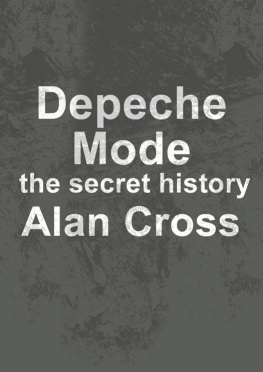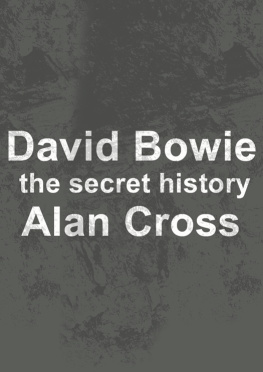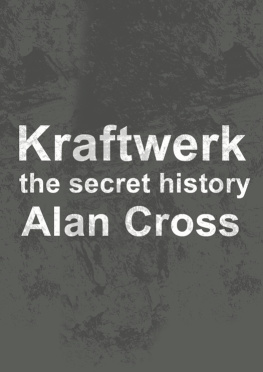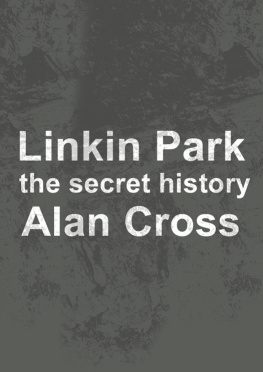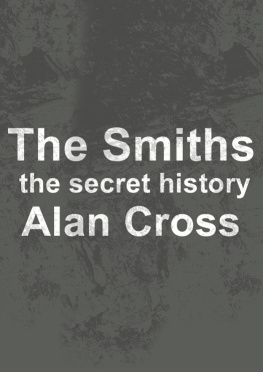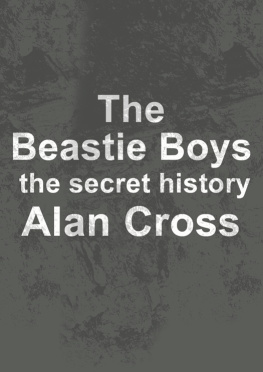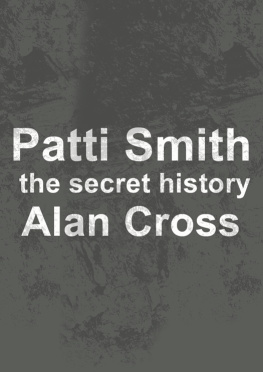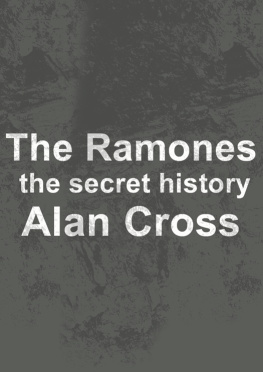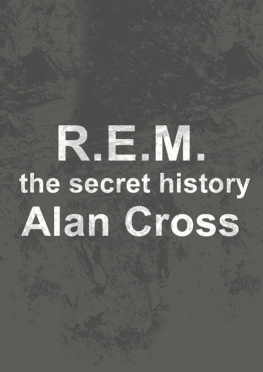Alan Cross - Depeche Mode: the secret history
Here you can read online Alan Cross - Depeche Mode: the secret history full text of the book (entire story) in english for free. Download pdf and epub, get meaning, cover and reviews about this ebook. year: 2012, publisher: HarperCollins Canada, genre: Non-fiction. Description of the work, (preface) as well as reviews are available. Best literature library LitArk.com created for fans of good reading and offers a wide selection of genres:
Romance novel
Science fiction
Adventure
Detective
Science
History
Home and family
Prose
Art
Politics
Computer
Non-fiction
Religion
Business
Children
Humor
Choose a favorite category and find really read worthwhile books. Enjoy immersion in the world of imagination, feel the emotions of the characters or learn something new for yourself, make an fascinating discovery.
- Book:Depeche Mode: the secret history
- Author:
- Publisher:HarperCollins Canada
- Genre:
- Year:2012
- Rating:4 / 5
- Favourites:Add to favourites
- Your mark:
- 80
- 1
- 2
- 3
- 4
- 5
Depeche Mode: the secret history: summary, description and annotation
We offer to read an annotation, description, summary or preface (depends on what the author of the book "Depeche Mode: the secret history" wrote himself). If you haven't found the necessary information about the book — write in the comments, we will try to find it.
Alan Cross is the preeminent chronicler of popular music.
Here he provides a history of electronic pioneers Depeche Mode.
This look at the group -- Music for the Masses--and Then Some -- is adapted from the audiobook of the same name.
Depeche Mode: the secret history — read online for free the complete book (whole text) full work
Below is the text of the book, divided by pages. System saving the place of the last page read, allows you to conveniently read the book "Depeche Mode: the secret history" online for free, without having to search again every time where you left off. Put a bookmark, and you can go to the page where you finished reading at any time.
Font size:
Interval:
Bookmark:
For the first 20 years of the rock and roll era, the electric guitar reigned supreme. As rock charged across the globe, the electric six-string was held aloft by conquering hordes of young people, who revered it as if it were some holy relic. As a scepter, a weapon and a powerful sexual talisman, the electric guitar came to symbolize everything that was rock and roll to the point where if the music didnt contain a fuzzed-out ax, then it just didnt rock. No exceptions.
Then, in the early 1970s, the synthesizer appeared. At first, these electronic keyboards were considered to be nothing more than expensive curiosities, unwieldy tools best left in recording studios where they could be programmed and played by classical musicians. But as the technology improved and prices dropped to within the reach of young musicians, rock and roll underwent a fundamental reexamination. Perhaps the guitar wasnt so essential after all.
Kraftwerk was the first band to show how electronics and computers could be incorporated into the rock and roll landscape. They were soon followed by scores of imitators, bands who based their entire identities and presentation around the fact that they did not play guitars. Nor, for that matter, did they need a drum kit or any of the other traditional rock instruments. This stew of transistors and printed circuits spawned Depeche Mode.
Originally just another bouncy techno-pop band of the short-lived new romantic movement, Depeche Mode grew into something more. As their music darkened and their presentation became more dramatic, the Basildon boys began to have a serious effect on the direction of alt-rock. Their use of keyboards, computers and studio technology set new worldwide standards for creativity, their obsession with remixes became legendary, and the attention to detail lavished on both their videos and stage production helped position them as true alt-rock superstars. And if that werent enough, behind all the glitter was enough gossip and intrigue to sink a dozen supermarket tabloids.
Martin Lee Gore (born July 23, 1961) started out as something of a school bully, who once beat another kid over the head with a brick. Much to the relief of his parents, he eventually straightened out, participating in a variety of student exchange trips before taking a safe job as a bank teller. Like Andy and Vince, he began hanging around a local club called the Van Gogh. When a local group of wannabes called Norman and the Worms brought a Moog Prodigy synthesizer into the club one night, he became hooked on the weird, otherworldly sounds it produced. Saving whatever he could from his job at the bank, Martin soon had a Prodigy of his own, which he used in a band called French Look.
With the lineup of No Romance in China constantly rotating, it was only a matter of time before Martin came into contact with Fletch and Vince. Soon they had formed a new group called Composition of Sound. Powered by a finicky drum machine, Vince (guitar), Fletch (bass) and Martin (synth) played a series of forgettable gigs in and around Basildon in late 1979. Things went so poorly that Vince decided to give up the guitarit was too hard to play and sing at the same timein favor of the infinite possibilities of the synthesizer. How could anyone not like a machine that made a novice sound like a virtuoso with a few twists of a knob? The synthesizer was a wonderful equalizer among the musically inclined, not to mention the musically challenged.
To complete the lineup, they started looking for a singer. They found Dave Gahan (born May 9, 1962), a skinny ex-punk who was one of the worst juvenile offenders in town. Dave had a habit of stealing cars. The ones he couldnt steal, he set on fire. Graffiti, theft, vandalismDave was into all of it along with pills, pot and hash. By the time he left school, not only had he been sent to juvenile court three times but Dave had gone through close to 20 different jobs ranging from selling soft drinks to a position at a perfume-bottling factory. One of his most identifying characteristics was a broken-line tattoo around his neck captioned Cut Here. As he approached his late teens, most people wrote off Dave as a lost cause until he seemed to settle down, taking a college course in window design.
After running through a rough version of Heroes, Dave was given the job.
All that was necessary to relaunch the group was a new name. Many different combinations were considered: Peter Bonettis Boots, the Lemon Peels, the Runny Smiles and the Glow Worms. Dave came up with the winner: Depeche Mode, the name of a popular French fashion magazine. The literal translation of the phrase is fast (or rapid) fashion.
As the new decade began, Depeche Mode made a crucial decision: all guitars would be jettisoned in favor of keyboards. Caught up in the modernism of post-punk music and fascinated by the all-electronic approach of groups such as Orchestral Manoeuvres in the Dark and the Human League, Depeche Mode believed that synthesizers were the wave of the future. Besides, they were easier to carry from gig to gig than bulky guitars and amplifiers.
The album reached a solid number 10 in the UK. Even more impressive, however, was that this unknown British act managed to place their debut album in the top 200 in America. Airplay of import copies of Speak and Spell (the album wasnt released domestically in the United States until March 1982) pushed the record to number 192.
However, the sudden success of Depeche Mode left Vince Clarke mysteriously gloomy. Hed grown to prefer the friendly and manageable silent confines of the recording studio to clubs, concert halls and TV studios. As the momentum of Speak and Spell threatened to force the band into a long series of performances, Vince decided that he needed out. Although he had decided to leave back in the fall, he made it official only after a tour wrapped up. On December 1, 1981, Vince announced that he, the chief songwriter of one of the hottest acts of the year, was leaving. His last appearance with Depeche Mode was at the London Lyceum on December 3.
After a six-month probation period that lasted through the bands first North American tour, Alan was hired full-time.
The transition from Vince to Martin was virtually seamless, as a succession of Gore-penned songs (See You, The Meaning of Love, Leave in Silence) turned into hit singles throughout 1982. The first post-Vince album, A Broken Frame (released on September 27), peaked at a comforting number eight in the UK despite the fact that most of the material had been lying around Martins house for years. Some of the songs on the album had been written when he was just 16.
Following a major world tour that saw hysterical fans beaten back with truncheons by Hong Kong riot police, Depeche Mode returned to the studio to begin working on their fourth album. One of the first songs to emerge from the sessions was People Are People, a clanking, mid-tempo number that, on the surface, was a somewhat effeminate-sounding plea for equality, peace and harmony. However, closer inspection revealed that the band was once again using new and radical recording techniques. For example, the uniquely powerful bass drum sound was achieved by hitting the skin with a chunk of metal. Instead of a plastic pick, the guitar was strummed using a coin. The effect was cold, mechanical and above, all, very serious. While many of the groups techno-pop and new romantic contemporaries (Heaven 17, Flock of Seagulls, Soft Cell, Spandau Ballet, Human League, etc.) were either running out of ideas or turning away from a pure synthesizer approach, Depeche Mode continued to evolve. This evolution had some unexpected consequences; the harsh percussive approach of Construction was soon adopted by the still-developing industrial music scene.
Font size:
Interval:
Bookmark:
Similar books «Depeche Mode: the secret history»
Look at similar books to Depeche Mode: the secret history. We have selected literature similar in name and meaning in the hope of providing readers with more options to find new, interesting, not yet read works.
Discussion, reviews of the book Depeche Mode: the secret history and just readers' own opinions. Leave your comments, write what you think about the work, its meaning or the main characters. Specify what exactly you liked and what you didn't like, and why you think so.

